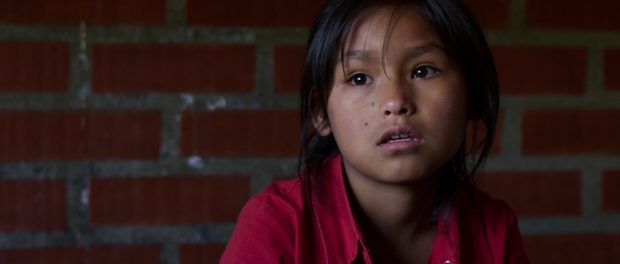Léa Pool’s Double Peine: The Word is Finally Given to the Children
After the film adaptation of Sophie Bienvenu’s book Worst Case, We Get Married, the Swiss filmmaker Léa Pool, who has been living in Quebec for more than 40 years, presents the documentary Double Sentence (original french: Double Peine). In this new film, which will be screened on November 3, the director is interested in imprisoned mothers, but especially in the children who are collateral victims of women’s imprisonment. These children are forgotten, even ostracized. They are sometimes recovered by organizations that ensure that they go to school and that a link with their mother is maintained. Double Sentence is a powerful and moving film in which one becomes aware of women’s double sentence: they are punished for the crimes they have committed, but they must also live with the distance that separates them from their children for long periods of time.
The documentary is divided into four chapters. The film opens on the children of Nepal, then those of Quebec, Bolivia, and finally of New York. In Nepal, if children have no one to stay with while their mothers are incarcerated, they live with them in prison. What is terrible is that children cannot touch their mothers; there are bars separating them. Of the four chapters, that of Nepal is the darkest picture, but some light emerges. These children are happy to see their mothers, and celebrations are organized. We also meet Indira Ranamagar, who hosts more than 400 children in different homes. They live in community rather than being left on their own. The ray of light is Indira’s hard work to prevent these children from living alone with their sorrow and allows a family bond to exist even though it is already weakened.
Then we go to Quebec. Of all the children interviewed, Karolyne-Joany is the one who is really mad: she is frustrated to see her mother go back to prison. This girl even plays the role of the mother, because she reminds her own mother that it’s wrong to steal. It’s incredible to witness this child’s lucidity as someone who must grow up quickly. Each of these young people had painful experiences and had their mother taken away from them because of crime. Children from other countries, to my surprise, are not angry with their mother. On the contrary, they magnify this woman who they do not see often. One would expect a different reaction from them. This is a great strength of this film: the constant questioning of our own mentalities.

Double Peine
And here we are in Bolivia. We learn that about 2100 children live in prison with their mothers. Another thing that surprised me is a woman who explains that if the mother is in prison, the prison becomes home for children. This is an entirely unexpected reasoning. I never thought of it that way and we could be shocked. On the other hand, these children already bear the burden of maternal guilt. So living with their mother is better for many of them.
Last stop: New York. We meet Andrea who had the chance to go on a plane trip with other children to see her mother in prison. The teenager felt guilty when her mother was incarcerated, but she still loves her.
Léa Pool made a film that is far from insisting excessively on the misery of children. Instead, it casts a glimmer of hope by opening the dialogue, allowing ostracized children to express themselves. Throughout the film, the charter of rights written by young people whose parents are incarcerated is presented between two scenes. These rights struck me by their simplicity. These children, as well as their mothers, have rights and their fate should be taken into account once the sentence is pronounced. Double Sentence asks that we ask ourselves questions and reflect on the fate of a growing number of children who live far from their mothers. It is necessary to question the possibilities of introducing measures which would allow the filial link to exist.
Double Sentence is now playing in theatres. To read an interview with director Lea Pool, click here.






